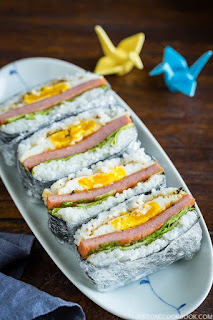If you love a popular Hawaiian favorite SPAM® Musubi, you will LOVE this SPAM® Onigirazu (スパムおにぎらず). The ingredients are similar to classic musubi; all you need is SPAM® product, rice, and nori (seaweed) sheet. The biggest difference is that you could add more fillings in Onigirazu, and today I added lettuce and fried egg to make it more like a breakfast dish. This combo of deliciousness is potable and hearty enough to fill a hungry stomach anytime of the day. You’ll love it for picnic, road trip snack or plane food too!
How To Make Spam Onigirazu
Ingredients
· 6 large eggs
· 1 SPAM® product (7 oz)
· 1 Tbsp neutral flavor oil (vegetable, canola, etc)
· 6 sheets nori (seaweed)
· 3 cups cooked Japanese short grain rice
· Kosher salt
· 1 Tbsp furikake (rice seasoning)
· 6 leaves lettuce (I used ice burg lettuce for the crunch)
Seasonings:
· 1 Tbsp mirin
· 1 Tbsp soy sauce
Instructions
1. Gather all the ingredients.
2. Heat 1 Tbsp. vegetable oil over medium high heat in the frying pan and cook the eggs as you like. I made the egg “over hard” (over well), which is a fried egg turned over and cooked until the yolk is solid. Make the eggs in batches if necessary, and transfer to a plate when they are cooked.
3. Meanwhile take out the spam from the can and cut into ¼ “ (6 mm) slices. You’ll get about 6-7 slices. Once the eggs are cooked, add the spam slices to the pan and cook both sides until nicely browned. Transfer the spam slices onto a plate.
4. Turn down the heat to medium low and add 1 Tbsp. mirin, 1 Tbsp. sake, and 1 Tbsp. soy sauce. Mix well quickly.
5. Transfer the spam slices back to the pan and coat well with the sauce.
6. Place a plastic wrap on a working surface and put a sheet of nori seaweed on top (shiny side facing down), with a corner pointing up. Evenly spread the steamed rice in a thin layer and form into a square shape in the center of nori sheet. I’m using the onigirazu mold (read more about it here).
7. Sprinkle a little bit of kosher salt and furikake. Salt is added to prevent the food from spoiling as we eat onigiri, onigirazu, and bento at room temperature and typically without refrigeration.
8. Place the fried egg and spam slice on top.
9. Place the lettuce and thin layer of steamed rice on top, maintaining a nice rectangular/square shape.
10. Now if you have an onigirazu mold, pull up the mold carefully. Remember to moist the “lid” before you press down so rice does not get stuck to it.
11. Bring left and right corners of nori sheet towards the center. Fold gently but tightly to wrap around the layers at the center.
12. Then bring bottom and top corners towards the center. Continue to fold gently but tightly around the layers. Make sure the rice is tucked in nicely.
13. If you like your onigirazu to showcase the filling after cutting in half, mark with a piece of rice or lettuce strip perpendicular to the filling. When you add the filling, you can decide which way you want to cut so it looks the best when the ingredients are revealed.
14. Wrap tightly with plastic wrap. Set aside for 5 minutes with nori’s seam side down.
15. Cut the onigirazu with a sharp knife (following the mark that tells you which direction to cut). Run your knife in running water before cutting so that the cross-section will be clean. If you plan to make this the previous night, wrap the onigirazu with kitchen towel and keep in the refrigerator overnight. The towel will prevent the rice from getting hard from the cold temperature. Eat within 24 hours.
Source; click here
Advertisement








EmoticonEmoticon